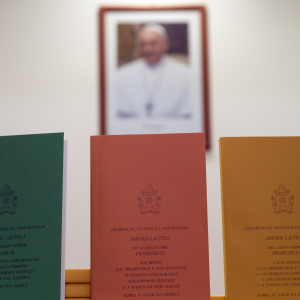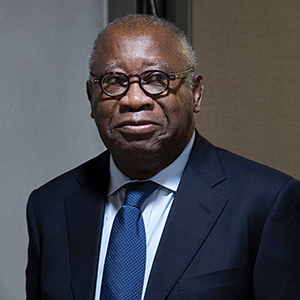The bishops of Ivory Coast have called for the release of political prisoners still being held following the post-election conflict of 2010-2011 that claimed more than 3,000 lives over five months. Speaking on behalf of other bishops at the Basilica of Our Lady of Peace in Yamoussoukro, the Bishop of Katiola, Ignace Bessi Dogbo, urged the Government to release political prisoners still in jail as a way of celebrating in a concrete manner the spirit of the Jubilee Year of Mercy.
Ivory Coast’s post-election conflict saw Muslim President Alassane Ouattara unseat the then president, the Catholic, Laurent Gbagbo (pictured above). Observers have long held that both supporters of Ouattara and Gbagbo committed atrocities, but the majority of those in prison are Gbagbo supporters. Gbagbo is being held by the International Criminal Court in The Hague. Roughly 40 per cent of Ivory Coast’s 20 million population are Muslim and 40 per cent are Christian.
Pope Francis urged the faithful to join in prayer on Wednesday 1 June, International Children’s Day, for the children in Syria. He said the day would be particularly significant for Christian communities in the country, where Catholics and Orthodox were to hold a special prayer for peace in which children were to be the protagonists. At his general audience on Wednesday last week, Francis prayed for the victims of terrorist attacks in Syria on the previous Monday. More than 160 people were killed in coordinated attacks by Islamic State (IS) on the cities of Jableh and Tartus. IS said it was targeting members of President Bashar al-Assad’s Alawite minority.
Religious exemptions stay
Australia’s Opposition Leader, Bill Shorten, said he has no plans to remove exemptions for religious organisations from anti-discrimination laws if his Labor Party wins the 2 July federal (general) election. But he has repeated his call for a parliamentary vote on same-sex marriage instead of the conservative coalition Government’s commitment to a referendum on the issue. Campaigning in Perth on 24 May, Mr Shorten was asked if he would retain exemptions that allow religious welfare agencies, hospitals and schools to not hire gays, lesbians and divorcees if they did not comply with the doctrine of the religious body. “We are not interested in telling religious organisations how to run their faith-based organisations,” Jesuit-educated Mr Shorten said. “We haven’t seen the case made to change.”
Hebe de Bonafini, 87, founder and president of the Association of the Mothers of the Plaza de Mayo, met Pope Francis on Friday last week. The Association was formed by mothers of “disappeared” dissidents (los desaparecidos) during the 1976-1983 military dictatorship in Argentina. During this period, Hebe de Bonafini (pictured above) lost two sons and her daughter-in-law. Speaking after her meeting with Francis, she said the two had embraced and that she had apologised for earlier criticisms she had made of the Pope.
The Caritas Europa Regional Conference meeting in Lourdes from 23 to 26 May called on European leaders to join forces with civil society organisations and churches to build an inclusive and outward-looking Europe. “Europe needs a fresh start, a new pan-European project that holds solidarity, fraternity and the dignity of people at its core,” said Mgr Luc Van Looy, President of Caritas Europa. More than 300 people from 42 European countries including CAFOD and CSAN from England and Wales, attended the conference. Meanwhile the Pope told members of the general chapter of the Little Work of Divine Providence on 27 May to “keep watch so that faith does not become an ideology and charity is not reduced to philanthropy, so that the Church doesn’t end up becoming an NGO”.
Refugees’ first communion
On Friday last week, the first of three rounds of displaced Iraqi children made their First Communion in a refugee camp in Erbil. Out of the 5,500 people living in Erbil’s Aishty 2 camp for the displaced, the majority – more than 2,000 – are children. Of these, 470 are making their First Communion in three different groups between 27 May and 10 June. All of the children are from the Syriac-Catholic rite, and most fled the city of Qaraqosh, Iraq, with their families when Islamic State terrorists attacked on the night of 6 August 2014. Syriac-Catholics have now been left without any official diocese or headquarters. Residing in a largely Chaldean-dominated Erbil, they have been welcomed by the local Church.
Stance ‘deficient’
Fr Klaus Mertes, SJ, former rector of Canisius-Kolleg in Berlin, has called on all Catholics, “both heterosexuals and homosexuals”, to make greater efforts to get the Church to change its “deficient” stance on homosexuality. The reason why the Catholic Church rejected homosexuality was because it combined sex with fertility, Mertes explained in a 25 May interview in the German daily taz. Sexual morality should be seen from a standpoint of unselfish neighbourly love “and not purely from a concept of nature which views the sexual act in isolation”, he said. His revelations about abuse at Canisius Jesuit high school helped trigger the 2010 “abuse tsunami” in the German-speaking world.
Russia’s Orthodox Patriarch has thanked President Vladimir Putin, pictured above with the Greek President, Prokopis Pavlopoulo, for funding restoration at Mount Athos in Greece during a joint visit to the autonomous peninsula’s Russian-owned monastery. Patriarch Kirill accompanied Mr Putin last weekend to St Panteleimon monastery, founded in 1016. In a speech to the monastery’s governing body, or Holy Kinot, Mr Putin said Mount Athos had become “extremely important” at a time when Orthodoxy was “being strengthened in Russia and other countries”.
Archbishop Anthony Fisher of Sydney, who was paralysed from the neck down just before Christmas last year by Guillain-Barre Syndrome, told Sydney radio host Alan Jones on 27 May that “music and gelato” played a part in his recovery. “When I was in St Vincent’s Hospital, one of the physios said, ‘We are going to escape’, and he wheeled me out in my wheelchair to the Gelataria Messina. There was music playing in that gelataria and suddenly I found one of my fingers moving to the beat of the music. At that stage nothing in my upper limbs had moved at all, but I am convinced now of the power of music, and I might say gelato,” the archbishop said.
02 June 2016, The Tablet
News Briefing: global
 Loading ...
Loading ...
Get Instant Access
Subscribe to The Tablet for just £7.99
Subscribe today to take advantage of our introductory offers and enjoy 30 days' access for just £7.99



